Design Workshop: The Shed Roof
There are few architectural elements in a home that suggest “traditional” or “contemporary” as strongly as roof shape. Ask a child to draw a house and you’re likely to get a box capped with the classic gabled roof. So too the flat roof and its association with contemporary architecture. The shed, or single-slope, roof lies between. Neither entirely contemporary nor completely traditional, it brings to mind images of the woodshed or toolshed — classically informed, but contemporary in its utility.
For an architect, the selection and design of a roof form has less to do with signifying modern or traditional and more to do with determining what that roof can do for the interior space, how it can actively respond to the local climate and site conditions, and the specific requirements of the homeowner. The shed roof happens to be a particularly adaptable solution — and here’s why.
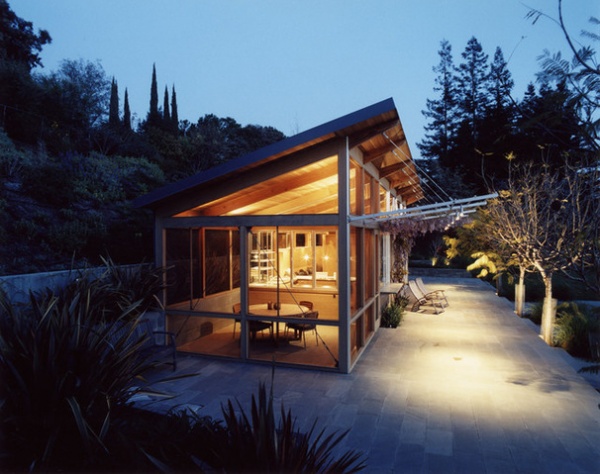
Structural Simplicity
Shed roof forms are inherently simple from a structural standpoint. The roof loads are transferred to the exterior walls, which either act as load-bearing walls or, as in this example, are supported by simple beams and columns. Depending on the interior room shape desired, the shed roof can transfer these loads to the bearing points using trusses, a combination of beams and purlins, or simple roof rafters spanning from eave to eave.
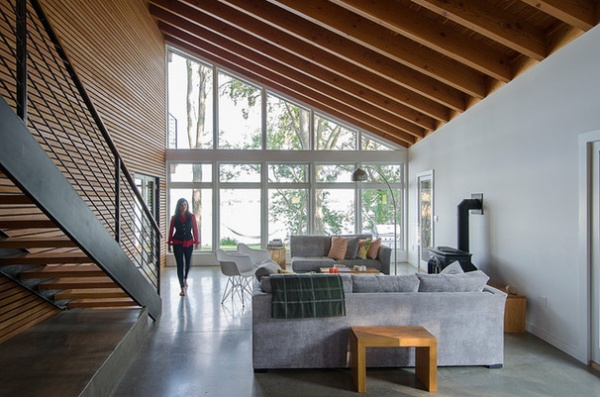
Each variation offers more or less interior detail. A series of regularly spaced rafters (spaced roughly 24 inches apart on center) across the ceiling here displays the structural logic and lends a richly textured cap to the room. It’s also great for a room’s acoustics.
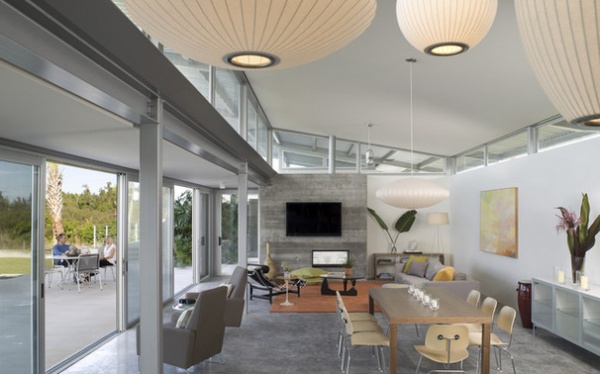
Here the architect has hidden the structural framing to create a clean, minimalistic aesthetic that helps to maximize the amount of reflected light.
Choosing whether to express the structure inside has an impact on the insulation too. In this example the depth of the framing members can be filled with insulation, and it’s concealed by the ceiling finish. Exposed framing requires the insulation to be placed above the plane of the interior ceiling, resulting in a thicker roof build-up.
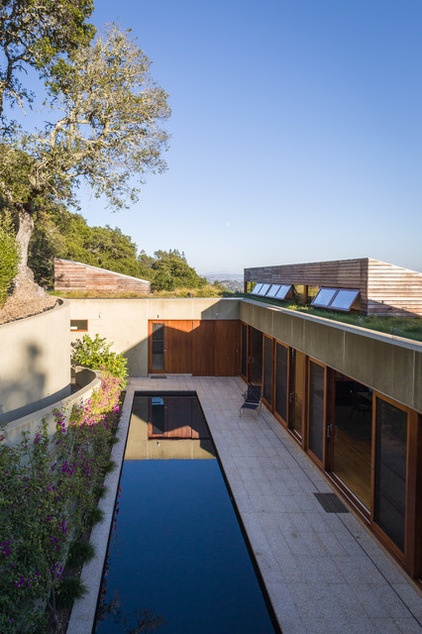
Site Responsive
When architects talk about a building being site responsive, we mean that its shape and layout are informed by the particulars of a given place. Depending on the site, that can mean many different things. A sloping topography, distant views, a significant boulder or tree, the climate and solar exposure are all things to which we can respond, and the shed roof offers unique opportunities for each.
Topography. Mirroring the surrounding topography with the roof form, as this project does, reduces the scale and visual impact of a home on the site. It fits an overall idea about fitting a home to a place.
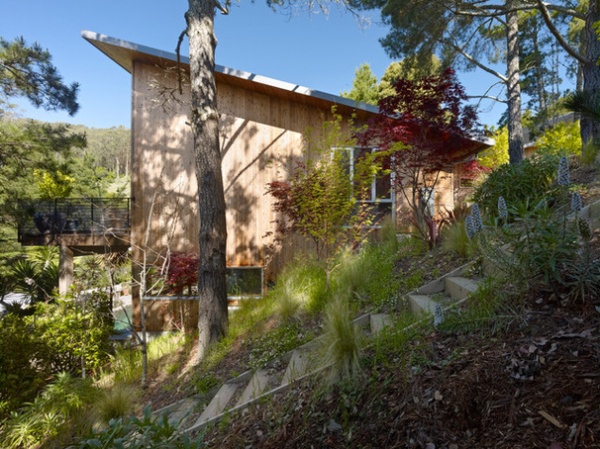
Using the roof form to oppose the slope distinguishes the building form and opens up different spatial opportunities. Here it’s used to insert two full floor levels on the downhill side.
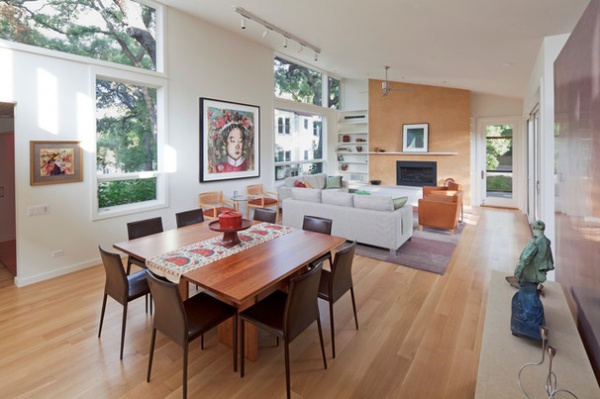
Passive solar. The shed shape is an efficient means of addressing a given latitude’s solar concerns. In northern climates, positioning the low eave of the shed toward the north minimizes the building’s surface area and heat loss on a cold exposure. The tall wall — the shed’s peak — would face south to collect the sun and passively heat the space.
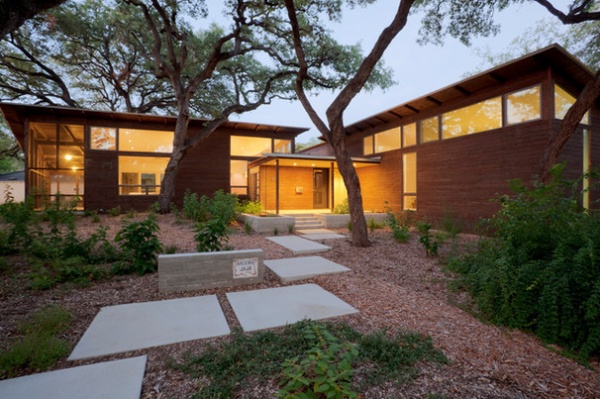
In hot climates the shed can be oriented to minimize heat gain from southern and western exposures while still permitting plenty of indirect daylight.
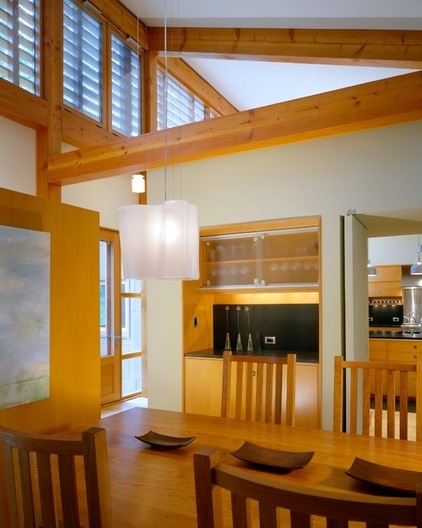
With large amounts of south-facing glass, special care must be taken to prevent overheating. This is true for all climates, as these windows can introduce great quantities of heat into a home year-round.
Adding louvered slats to the exterior, as in this project, can thoughtfully modulate the heat gain. The slats here are designed for a specific latitude to cut off the high angle of the summer sun and admit the low angle of the winter sun.
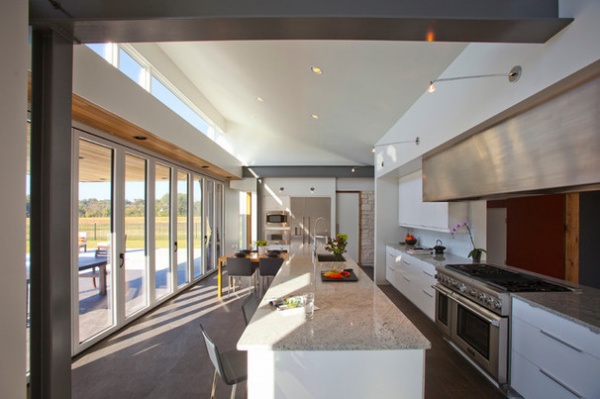
Using an interior light shelf with a shed roof is an excellent means of controlling both daylight and heat gain. The shelf helps to diminish the scale of the tall exterior wall and provides a comfortable frame of reference near eye level inside.
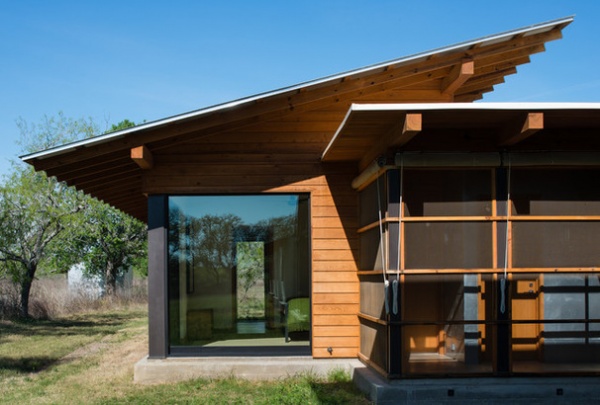
Overhangs are another passive design element that can help keep the heat from reaching the interior. They can be sized to shield direct heat gain during the hottest parts of the day while allowing light in and views out. This large overhang with expressed framing is a thoroughly modern, honest and functional aesthetic.
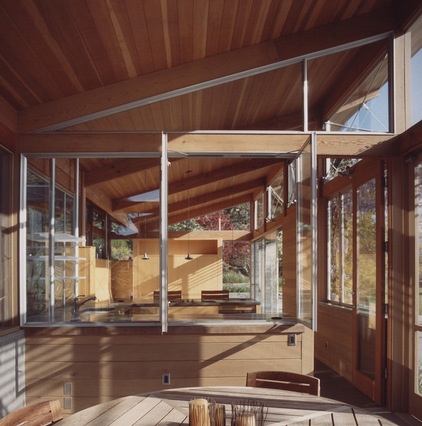
Daylighting (clerestories). With its raised peak, the clerestory window band is one of the most common types of glazing used with shed roofs. They make passive solar heating and daylighting strategies possible.
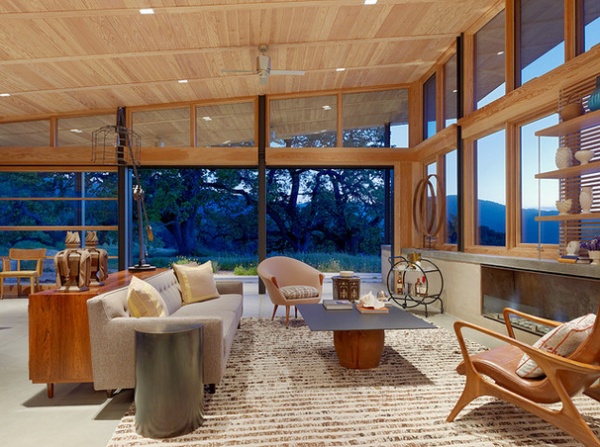
With floor-to-ceiling glass, the roof appears to hover and the entire room seems to be a part of the outdoors. The more daylight we can capture, the less we have to rely on artificial lighting sources.
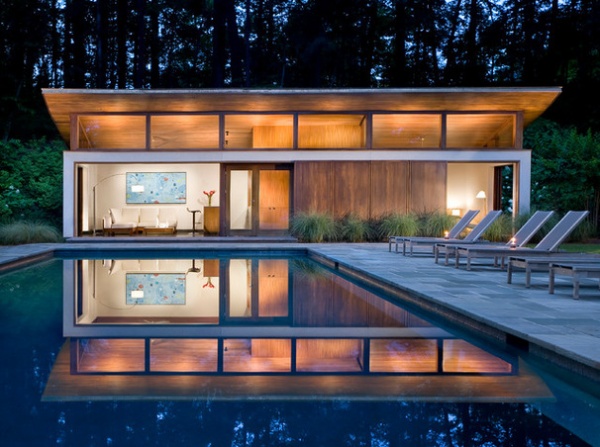
Weather protection. While we can design any roof to adequately keep out the weather, the shed has a few benefits that other shapes don’t. The wedge shape has a clear front and back side that can be used to buffer prevailing wind patterns, and to direct water and snow away from walkways, entry points and gathering places. In this way the roof form delivers on its name, shedding the undesirable elements from the places we use most often.
The depth of the roof overhang affects just how much weather the nearby interior spaces are subject to as well. Deep overhangs can help mitigate the risk of water infiltration, especially at the more vulnerable large glazed areas we see in many of these examples.
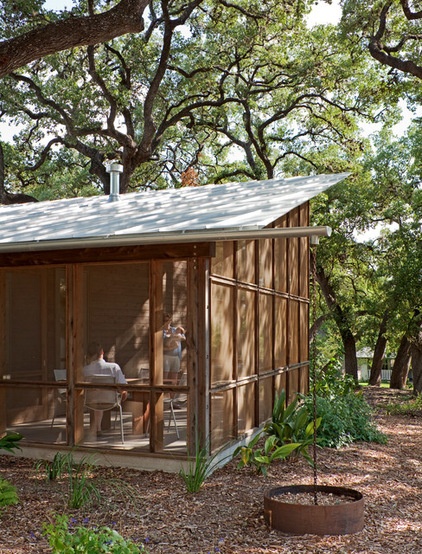
Rainwater harvesting. While the roof protects, it can also provide. It can efficiently gather rainwater and direct it to a single point of collection to be used for irrigation, or can simply channel it away from the building’s foundation.
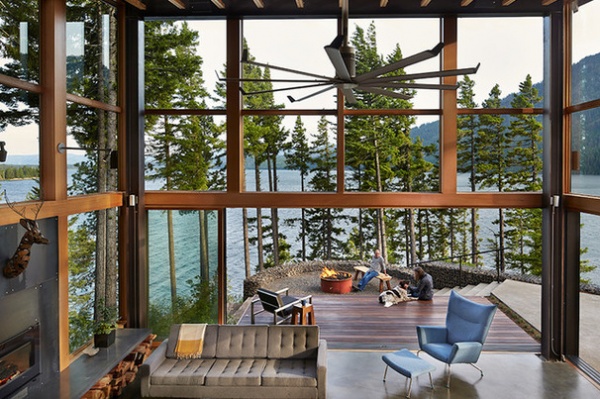
Directional (views). The form of the roof as viewed from inside naturally directs our eyes up and outward. Here the roof is used as a dynamic directional element, focusing us toward a spectacular view. Contrast this with gabled and flat roofs, which are inherently more static and inward looking.
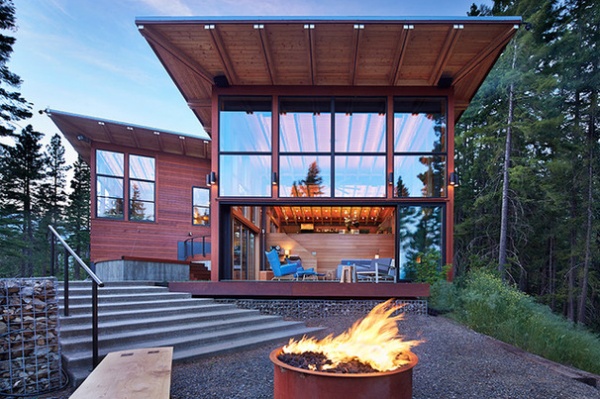
This directional effect can be leveraged to refocus interior spaces away from less desirable views (or neighbors) and toward more optimal ones.
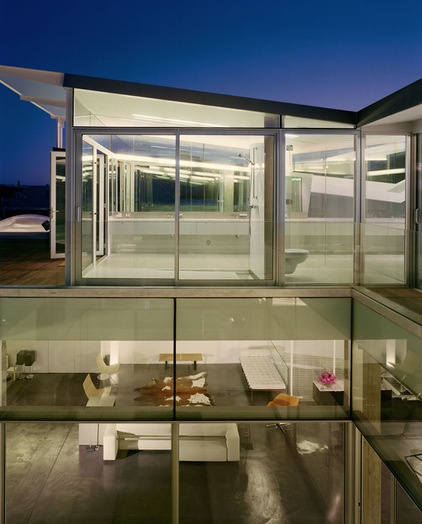
Roof Slope
The slope of the shed roof has important design impacts. For any given horizontal room dimension, there’s a delicate balance between the shorter structural members required for a lower slope and the longer structure required for a steeper slope. Longer spans require deeper framing members, heavier sections or both. When the roof plane becomes thick, it can feel too heavy and hat-like. This project maintains a lean section befitting the proportions of the thin architectural elements used elsewhere.
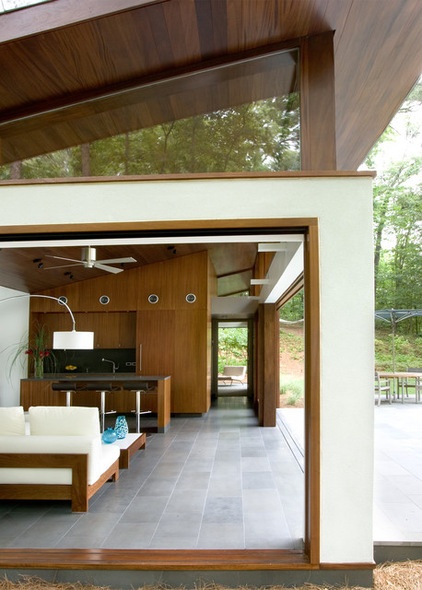
The roof slope affects the headroom at the high and low eaves inside, as well as how grand the space will feel.
It’s good practice to consider the slope alongside the building’s latitude to achieve the optimal solar exposure, as discussed earlier. Steeper pitches are better in higher latitudes; lower pitches in lower altitudes.
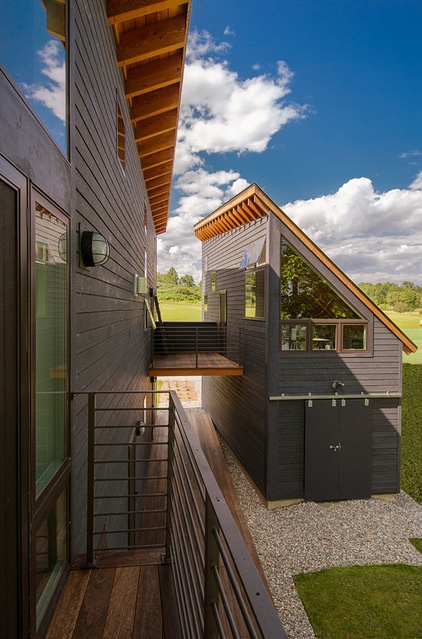
Steep sheds require careful planning inside to maintain headroom clearances at the eaves. In snow country very steep pitches will shed snow even if they’re shingled. Remember to take this into account and use the shape to do the shoveling for you.
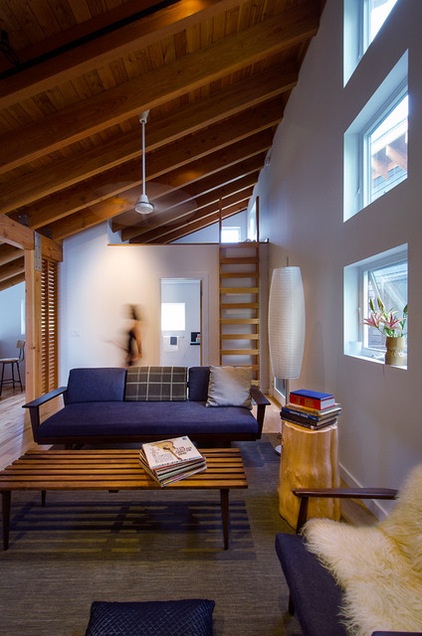
With this shed, attic space has been traded for living space, opening up some opportunities, like the loft seen here.
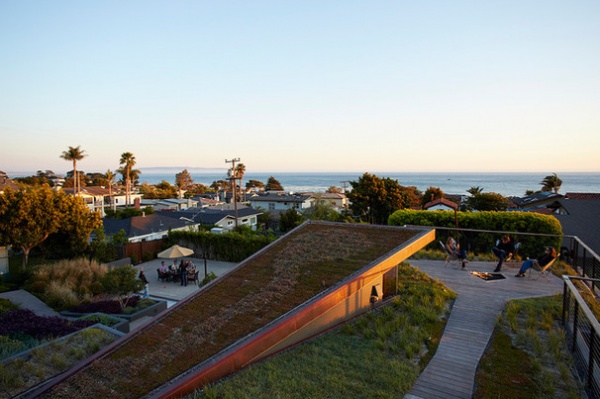
Materials
The roof slope has a direct effect on the materials a shed roof can be covered with. Any slope less than 2 inches in 12 inches is considered flat and must be waterproofed as such. Slopes between 2:12 and 4:12 are generally considered low slope, while those between 4:12 and 12:12 are considered conventionally sloped. Each roof material has its own limitation with respect to roof slope, beyond which it’s either not advisable to use, or special procedures must be followed to install that material. Having said this, with the right budget, (almost) anything is possible.
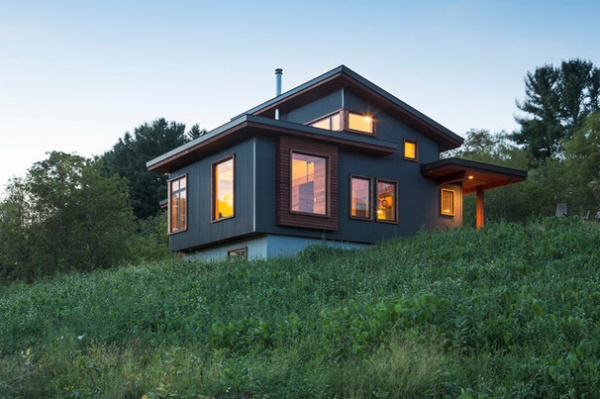
Modern and Traditional
The formal ambiguity of the shed roof can be a real benefit to those who prefer the look of a more modern aesthetic but aren’t willing to fully embrace the idea of the flat roof. The shed form has both a traditional identity and a contemporary feel, which is why it’s such a widely embraced and versatile design element.
Read more Design Workshop stories












